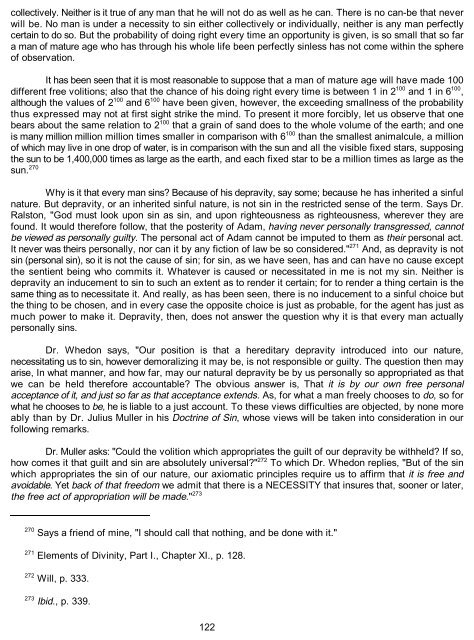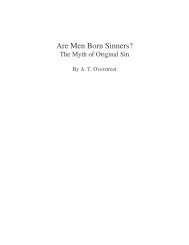Foreknowledge by Joel Hayes - Library of Theology
Foreknowledge by Joel Hayes - Library of Theology
Foreknowledge by Joel Hayes - Library of Theology
You also want an ePaper? Increase the reach of your titles
YUMPU automatically turns print PDFs into web optimized ePapers that Google loves.
collectively. Neither is it true <strong>of</strong> any man that he will not do as well as he can. There is no can-be that never<br />
will be. No man is under a necessity to sin either collectively or individually, neither is any man perfectly<br />
certain to do so. But the probability <strong>of</strong> doing right every time an opportunity is given, is so small that so far<br />
a man <strong>of</strong> mature age who has through his whole life been perfectly sinless has not come within the sphere<br />
<strong>of</strong> observation.<br />
It has been seen that it is most reasonable to suppose that a man <strong>of</strong> mature age will have made 100<br />
100 100<br />
different free volitions; also that the chance <strong>of</strong> his doing right every time is between 1 in 2 and 1 in 6 ,<br />
100 100<br />
although the values <strong>of</strong> 2 and 6 have been given, however, the exceeding smallness <strong>of</strong> the probability<br />
thus expressed may not at first sight strike the mind. To present it more forcibly, let us observe that one<br />
100<br />
bears about the same relation to 2 that a grain <strong>of</strong> sand does to the whole volume <strong>of</strong> the earth; and one<br />
100<br />
is many million million million times smaller in comparison with 6 than the smallest animalcule, a million<br />
<strong>of</strong> which may live in one drop <strong>of</strong> water, is in comparison with the sun and all the visible fixed stars, supposing<br />
the sun to be 1,400,000 times as large as the earth, and each fixed star to be a million times as large as the<br />
sun. 270<br />
Why is it that every man sins? Because <strong>of</strong> his depravity, say some; because he has inherited a sinful<br />
nature. But depravity, or an inherited sinful nature, is not sin in the restricted sense <strong>of</strong> the term. Says Dr.<br />
Ralston, "God must look upon sin as sin, and upon righteousness as righteousness, wherever they are<br />
found. It would therefore follow, that the posterity <strong>of</strong> Adam, having never personally transgressed, cannot<br />
be viewed as personally guilty. The personal act <strong>of</strong> Adam cannot be imputed to them as their personal act.<br />
271<br />
It never was theirs personally, nor can it <strong>by</strong> any fiction <strong>of</strong> law be so considered." And, as depravity is not<br />
sin (personal sin), so it is not the cause <strong>of</strong> sin; for sin, as we have seen, has and can have no cause except<br />
the sentient being who commits it. Whatever is caused or necessitated in me is not my sin. Neither is<br />
depravity an inducement to sin to such an extent as to render it certain; for to render a thing certain is the<br />
same thing as to necessitate it. And really, as has been seen, there is no inducement to a sinful choice but<br />
the thing to be chosen, and in every case the opposite choice is just as probable, for the agent has just as<br />
much power to make it. Depravity, then, does not answer the question why it is that every man actually<br />
personally sins.<br />
Dr. Whedon says, "Our position is that a hereditary depravity introduced into our nature,<br />
necessitating us to sin, however demoralizing it may be, is not responsible or guilty. The question then may<br />
arise, In what manner, and how far, may our natural depravity be <strong>by</strong> us personally so appropriated as that<br />
we can be held therefore accountable? The obvious answer is, That it is <strong>by</strong> our own free personal<br />
acceptance <strong>of</strong> it, and just so far as that acceptance extends. As, for what a man freely chooses to do, so for<br />
what he chooses to be, he is liable to a just account. To these views difficulties are objected, <strong>by</strong> none more<br />
ably than <strong>by</strong> Dr. Julius Muller in his Doctrine <strong>of</strong> Sin, whose views will be taken into consideration in our<br />
following remarks.<br />
Dr. Muller asks: "Could the volition which appropriates the guilt <strong>of</strong> our depravity be withheld? If so,<br />
272<br />
how comes it that guilt and sin are absolutely universal?" To which Dr. Whedon replies, "But <strong>of</strong> the sin<br />
which appropriates the sin <strong>of</strong> our nature, our axiomatic principles require us to affirm that it is free and<br />
avoidable. Yet back <strong>of</strong> that freedom we admit that there is a NECESSITY that insures that, sooner or later,<br />
273<br />
the free act <strong>of</strong> appropriation will be made."<br />
270<br />
Says a friend <strong>of</strong> mine, "I should call that nothing, and be done with it."<br />
271<br />
272<br />
273<br />
Elements <strong>of</strong> Divinity, Part I., Chapter XI., p. 128.<br />
Will, p. 333.<br />
Ibid., p. 339.<br />
122






